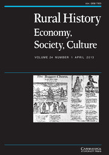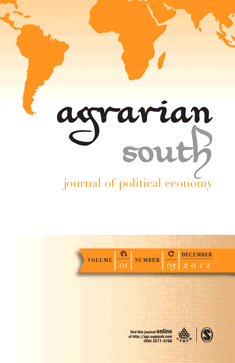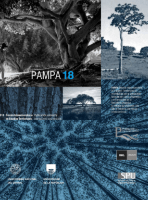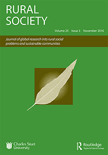
Rural History-Economy Society Culture
Scope & Guideline
Exploring the Tapestry of Rural Life Through History, Economy, and Culture.
Introduction
Aims and Scopes
- Exploration of Rural Economies:
The journal focuses on the economic structures and transformations within rural settings, examining agricultural practices, market dynamics, and the role of rural industries throughout history. - Cultural and Social Histories of Rural Communities:
It emphasizes the cultural narratives, social practices, and community dynamics that shape rural identities, examining how these have evolved over time. - Interactions Between Rural and Urban Spaces:
The journal investigates the complex relationships between rural areas and urban centers, including migration patterns, economic dependencies, and cultural exchanges. - Historical Perspectives on Land Use and Management:
It provides insights into historical land use practices, property rights, and the socio-political implications of land management throughout different periods. - Gender and Family Dynamics in Rural Settings:
The journal examines the roles of gender and family structures in rural economies and societies, highlighting the contributions and experiences of women and marginalized groups. - Environmental History and Conservation:
It explores historical perspectives on environmental management and conservation efforts in rural landscapes, focusing on the interplay between human activity and ecological change.
Trending and Emerging
- Nutritional Transitions and Food Systems:
There is a growing interest in the historical shifts in food consumption, nutritional transitions, and their implications for rural economies, reflecting contemporary concerns about health, sustainability, and food security. - Gender Studies in Rural History:
Research focusing on gender dynamics, particularly the roles and experiences of women in rural economies, is gaining traction, highlighting the importance of inclusive historical narratives. - Environmental Sustainability and Conservation:
Emerging studies are increasingly addressing the historical contexts of environmental sustainability, conservation practices, and their socio-political implications, underscoring the relevance of these themes in the face of climate change. - Cultural Heritage and Identity in Rural Areas:
There is an uptick in research exploring cultural heritage, identity formation, and the preservation of rural traditions, reflecting a growing awareness of the significance of rural cultures in contemporary society. - Impacts of Globalization on Rural Communities:
Emerging themes include the effects of globalization on rural economies and societies, examining how global market trends and cultural exchanges influence local practices and identities.
Declining or Waning
- Industrialization's Impact on Rural Life:
Although industrialization has historically been a significant theme, recent publications suggest a shift away from examining its impacts directly on rural communities. This decline may reflect a broader focus on contemporary rural issues rather than historical industrial transformations. - Traditional Agricultural Practices:
The exploration of traditional agricultural practices appears to be less frequent, possibly indicating a move towards examining modern agricultural technologies and practices instead. - Rural Poverty as a Central Theme:
While rural poverty remains an important topic, there seems to be a decrease in studies focusing solely on poverty dynamics without integrating broader socio-economic contexts, reflecting a more holistic approach in recent research. - Historical Case Studies of Specific Regions:
There is a noticeable reduction in highly localized case studies, suggesting a trend towards more comparative or thematic analyses that transcend specific geographic confines. - Rural-Urban Migration Studies:
The frequency of papers specifically addressing rural-urban migration trends has diminished, possibly overshadowed by a broader interest in migration's socio-economic impacts.
Similar Journals

Debates en Sociologia
Enhancing Visibility for Groundbreaking Sociological ResearchDebates en Sociologia is a prominent peer-reviewed journal that serves as a vital platform for sociological discourse and research in the Latin American context. Published by the Pontificia Universidad Católica del Perú, this esteemed journal has embraced an Open Access model since 2005, ensuring that scholars and policymakers have unrestricted access to its rich array of articles advancing contemporary sociological thought and practice. The journal encourages submissions that stimulate critical discussions about social issues, offering a space for innovative research, theoretical explorations, and empirical studies. With its ISSN 0254-9220 and E-ISSN 2304-4284, Debates en Sociologia is committed to enhancing the visibility of research in sociology, thus making significant contributions to both regional and global academic dialogues. Its dedication to fostering interdisciplinary connections within the social sciences highlights the journal's importance for researchers, professionals, and students seeking to expand their understanding of sociological phenomena.

Agricultural and Resource Economics-International Scientific E-Journal
Innovating research for a greener future.Agricultural and Resource Economics-International Scientific E-Journal is a leading open-access publication dedicated to advancing the fields of agricultural and resource economics. Published by the esteemed INST EASTERN EUROPEAN RESEARCH & CONSULTING since 2015, this journal provides a vital platform for innovative research and discourse, particularly within the context of Eastern Europe. With an impressive Q2 ranking in Agricultural and Biological Sciences and Q3 rankings in both Business, Management and Accounting and Marketing, it serves as a key resource for academics and practitioners alike, fostering collaboration and knowledge exchange. The journal's commitment to accessibility and inclusivity is evident through its open-access policy, allowing researchers from around the globe to share and benefit from cutting-edge findings. Set against the backdrop of a rapidly evolving agricultural landscape, this journal plays a crucial role in exploring the intersection of economics, sustainability, and resource management, making it an essential read for anyone invested in the future of these critical fields.

Agrarian South-Journal of Political Economy
Navigating the Complexities of Agrarian Issues through Interdisciplinary ResearchAgrarian South-Journal of Political Economy is a prestigious academic journal published by SAGE Publications Inc, dedicated to advancing the understanding of the intricate relationships between agrarian structures and socio-economic dynamics in the Global South. With a keen focus on cultural studies, ecology, geography, and social sciences, this journal offers a rich platform for interdisciplinary research that enhances scholarly dialogue and drives critical insights. The journal has achieved remarkable recognition, having been ranked Q1 in Cultural Studies and Q2 in various social science disciplines as of 2023, reflecting its impact and relevance in academia. Despite not offering Open Access, it remains a vital resource for researchers and students seeking to explore the socio-political dimensions of agrarian issues. By bridging empirical research with theoretical frameworks, Agrarian South aims to illuminate the complexities of agronomy in developing regions, fostering a deeper understanding and contributing to sustainable development.

Pampa
Empowering Voices: Contributing to the Dialogue on Pampas Studies.Pampa is a distinguished academic journal dedicated to the exploration and dissemination of research across various disciplines, with a special focus on regional studies and environmental issues prevalent in the Pampas region of Argentina. Published by EDICIONES UNL, this open access journal has been providing researchers, professionals, and students with vital insights and current developments in the field since its inception in 2005. With its ISSN 1669-3299 and E-ISSN 2314-0208, Pampa prioritizes accessibility and visibility, ensuring that scholarly work is freely available to a global audience. Researchers are encouraged to submit their findings and contribute to the ongoing dialogue within this vibrant and critical area of study. By promoting open access to significant research, Pampa enhances collaborative efforts and fosters innovation within the academic community.

Estudios Socioterritoriales
Advancing Insights into Socioterritorial Dynamics.Estudios Socioterritoriales, published by the Universidad Nacional del Centro de la Provincia de Buenos Aires in partnership with the Centro de Investigaciones Geográficas, is a leading academic journal that focuses on the complex interrelations between society and territory. With an ISSN of 1515-6206 and an E-ISSN of 1853-4392, this Open Access journal has been democratizing access to research since 2013, allowing scholars from around the world to share and engage with cutting-edge socioterritorial studies. Located in the vibrant academic environment of Tandil, Argentina, this journal is dedicated to fostering interdisciplinary dialogue and publishing high-quality research that explores various dimensions of geographic and social phenomena. By catering to a diverse audience of researchers, professionals, and students, Estudios Socioterritoriales plays a crucial role in advancing understanding of spatial dynamics and their implications for society.

Lares-Quadrimestrale di Studi Demoetnoantropologici
Exploring the Rich Tapestry of Human CulturesLares-Quadrimestrale di Studi Demoetnoantropologici is a prominent scholarly journal dedicated to the fields of demoethnoanthropology, exploring the intersections of cultural practices, traditions, and social dynamics. Published by CASA EDITRICE LEO S OLSCHKI, this esteemed journal provides an academic platform for researchers and practitioners to disseminate original research findings and critical reviews, delving into ethnographic studies and community-based inquiries. With an ISSN of 0023-8503 and an E-ISSN of 2036-511X, Lares is recognized for its commitment to scholarly excellence and its contribution to advancing knowledge within its field. Although it currently categorizes as non-open access, the journal remains highly regarded among academics, ensuring the widespread dissemination of significant research. The journal's base in beautiful Florence, Italy, enhances its cultural richness and appeal, making it a notable reference point for scholars dedicated to the study of human cultures and social systems.

Rural Society
Connecting Research, Policy, and Rural InnovationRural Society, published by Routledge Journals, Taylor & Francis Ltd, is a prominent academic journal dedicated to exploring the complexities and dynamism of rural communities. Since its inception in 1991, the journal has served as a critical platform for advancing interdisciplinary research in the fields of tourism, leisure, and hospitality management, particularly in the context of rural societies. With an ISSN of 1037-1656 and an E-ISSN of 2204-0536, Rural Society has carved out a niche within the Q3 category of Scopus rankings, reflecting its commitment to high-quality research despite its positioning in the 26th percentile among its peers. This journal is vital for researchers, practitioners, and students alike, offering valuable insights into sustainable practices, social dynamics, and economic development within rural settings. While it does not currently offer open access, Rural Society continues to foster academic dialogue and innovation, providing readers with access to crucial findings that directly inform policies and practices impacting rural life.

AGRICULTURAL HISTORY REVIEW
Delving Deep into the Legacy of AgronomyAGRICULTURAL HISTORY REVIEW, published by the BRITISH AGRICULTURAL HISTORY SOC, serves as a vital resource for scholars and professionals exploring the intersections of agriculture, society, and history. With a publication history spanning from 1978 to 2023, the journal delves into diverse topics within the fields of agronomy, animal science, and the history of science, all while maintaining a commitment to rigor and scholarly excellence, as reflected in its prestigious rankings. Although it falls within Q4 in Agronomy, Animal Science, and Economics, it holds a commendable Q3 status in History and Philosophy of Science, indicating a significant contribution to the understanding of agricultural practices through historical lenses. The journal is based in the United Kingdom and is accessible for those interested in gaining insights into the historical aspects of agricultural development. While the journal does not provide open access options, it remains a critical reference for researchers seeking to enhance their understanding of agriculture's past and its implications for future practices.

Economic History of Developing Regions
Illuminating Economic Trajectories Through Historical Insights.Economic History of Developing Regions, published by Routledge Journals, Taylor & Francis Ltd, is a distinguished academic journal that focuses on the intersection of economic development and historical analysis in emerging economies. Established in 2010, this journal serves as a vital platform for researchers, professionals, and students interested in understanding the economic dynamics and historical contexts that shape developing regions. With its impressive ranking in the Q1 category in History and Q3 in both Development and Economics, it has established itself as a credible source for innovative research and critical insights. Despite being a non-open access publication, it consistently aims to bridge the gap between historical understanding and economic strategies, making it essential reading for those engaged in the studies of economics, history, and development. Emphasizing rigorous academic standards, the journal highlights quality scholarship that contributes to the discourse on sustainable development and policy frameworks essential for evolving economies.

Geografisk Tidsskrift-Danish Journal of Geography
Exploring the Dynamics of Earth and Space.Geografisk Tidsskrift-Danish Journal of Geography, an esteemed publication by the Royal Danish Geographical Society, serves as a pivotal platform for disseminating innovative research in the realms of geography and earth sciences. Established in 1972, the journal has sustained its academic rigor through 2024, achieving Q2 quartile rankings in both Earth and Planetary Sciences and Geography, Planning and Development. With an ISSN of 0016-7223 and E-ISSN 1903-2471, this journal engages a global audience, including researchers, professionals, and students who seek to explore diverse geographical and environmental issues through high-quality research articles. Although currently non-open access, the journal thrives as a vital resource within the academic community, evidenced by its notable Scopus rankings, which place it in the upper percentiles of its respective categories. By providing critical insights into geographical phenomena, Geografisk Tidsskrift plays an integral role in advancing the understanding of complex spatial dynamics and fosters scholarly dialogue among geographers worldwide.